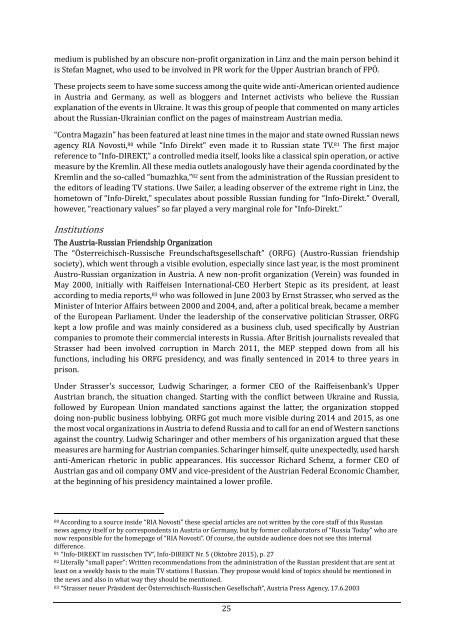to Central Europe
PC_reactionary_values_CEE_20160727
PC_reactionary_values_CEE_20160727
Create successful ePaper yourself
Turn your PDF publications into a flip-book with our unique Google optimized e-Paper software.
medium is published by an obscure non-profit organization in Linz and the main person behind it<br />
is Stefan Magnet, who used <strong>to</strong> be involved in PR work for the Upper Austrian branch of FPÖ.<br />
These projects seem <strong>to</strong> have some success among the quite wide anti-American oriented audience<br />
in Austria and Germany, as well as bloggers and Internet activists who believe the Russian<br />
explanation of the events in Ukraine. It was this group of people that commented on many articles<br />
about the Russian-Ukrainian conflict on the pages of mainstream Austrian media.<br />
“Contra Magazin” has been featured at least nine times in the major and state owned Russian news<br />
agency RIA Novosti, 80 while “Info Direkt” even made it <strong>to</strong> Russian state TV. 81 The first major<br />
reference <strong>to</strong> “Info-DIREKT,” a controlled media itself, looks like a classical spin operation, or active<br />
measure by the Kremlin. All these media outlets analogously have their agenda coordinated by the<br />
Kremlin and the so-called “bumazhka,” 82 sent from the administration of the Russian president <strong>to</strong><br />
the edi<strong>to</strong>rs of leading TV stations. Uwe Sailer, a leading observer of the extreme right in Linz, the<br />
home<strong>to</strong>wn of “Info-Direkt,” speculates about possible Russian funding for “Info-Direkt.” Overall,<br />
however, “reactionary values” so far played a very marginal role for “Info-Direkt.”<br />
Institutions<br />
The Austria-Russian Friendship Organization<br />
The “Österreichisch-Russische Freundschaftsgesellschaft” (ORFG) (Austro-Russian friendship<br />
society), which went through a visible evolution, especially since last year, is the most prominent<br />
Austro-Russian organization in Austria. A new non-profit organization (Verein) was founded in<br />
May 2000, initially with Raiffeisen International-CEO Herbert Stepic as its president, at least<br />
according <strong>to</strong> media reports, 83 who was followed in June 2003 by Ernst Strasser, who served as the<br />
Minister of Interior Affairs between 2000 and 2004, and, after a political break, became a member<br />
of the <strong>Europe</strong>an Parliament. Under the leadership of the conservative politician Strasser, ORFG<br />
kept a low profile and was mainly considered as a business club, used specifically by Austrian<br />
companies <strong>to</strong> promote their commercial interests in Russia. After British journalists revealed that<br />
Strasser had been involved corruption in March 2011, the MEP stepped down from all his<br />
functions, including his ORFG presidency, and was finally sentenced in 2014 <strong>to</strong> three years in<br />
prison.<br />
Under Strasser's successor, Ludwig Scharinger, a former CEO of the Raiffeisenbank's Upper<br />
Austrian branch, the situation changed. Starting with the conflict between Ukraine and Russia,<br />
followed by <strong>Europe</strong>an Union mandated sanctions against the latter, the organization s<strong>to</strong>pped<br />
doing non-public business lobbying. ORFG got much more visible during 2014 and 2015, as one<br />
the most vocal organizations in Austria <strong>to</strong> defend Russia and <strong>to</strong> call for an end of Western sanctions<br />
against the country. Ludwig Scharinger and other members of his organization argued that these<br />
measures are harming for Austrian companies. Scharinger himself, quite unexpectedly, used harsh<br />
anti-American rhe<strong>to</strong>ric in public appearances. His successor Richard Schenz, a former CEO of<br />
Austrian gas and oil company OMV and vice-president of the Austrian Federal Economic Chamber,<br />
at the beginning of his presidency maintained a lower profile.<br />
80 According <strong>to</strong> a source inside “RIA Novosti” these special articles are not written by the core staff of this Russian<br />
news agency itself or by correspondents in Austria or Germany, but by former collabora<strong>to</strong>rs of “Russia Today” who are<br />
now responsible for the homepage of “RIA Novosti”. Of course, the outside audience does not see this internal<br />
difference.<br />
81 “Info-DIREKT im russischen TV“, Info-DIREKT Nr. 5 (Ok<strong>to</strong>bre 2015), p. 27<br />
82 Literally “small paper”: Written recommendations from the administration of the Russian president that are sent at<br />
least on a weekly basis <strong>to</strong> the main TV stations I Russian. They propose would kind of <strong>to</strong>pics should be mentioned in<br />
the news and also in what way they should be mentioned.<br />
83 “Strasser neuer Präsident der Österreichisch-Russischen Gesellschaft”, Austria Press Agency, 17.6.2003<br />
25


